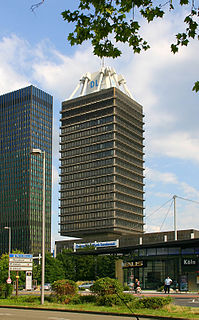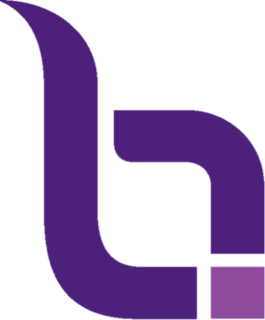Related Research Articles

Digital Video Broadcasting (DVB) is a set of international open standards for digital television. DVB standards are maintained by the DVB Project, an international industry consortium, and are published by a Joint Technical Committee (JTC) of the European Telecommunications Standards Institute (ETSI), European Committee for Electrotechnical Standardization (CENELEC) and European Broadcasting Union (EBU).
Public broadcasting involves radio, television and other electronic media outlets whose primary mission is public service. In many countries of the world, funding comes from governments, especially via annual fees charged on receivers.
Television broadcasting in Greece began in 1966, preceded in 1951 by statute 1963 permitting television broadcasting.

BBC Television is a service of the BBC. The corporation has operated public television services in the United Kingdom under the terms of a royal charter since 1927. It produced television programmes from its own studios from 1932, although the start of its regular service of television broadcasts is dated to 2 November 1936.
Free-to-air (FTA) services are television (TV) and radio services broadcast in clear (unencrypted) form, allowing any person with the appropriate receiving equipment to receive the signal and view or listen to the content without requiring a subscription, other ongoing cost, or one-off fee. In the traditional sense, this is carried on terrestrial radio signals and received with an antenna.

ABC NewsRadio, since 2017 broadcast under the ABC News brand and for a short time known as ABC News on Radio, is a 24-hour news radio service broadcast by the Australian public broadcaster, the Australian Broadcasting Corporation (ABC). ABC NewsRadio is available via a number of platforms around Australia, including AM/FM radio, online via web or the ABC Listen app, DAB+ radio, free-to-air digital TV, and some pay-TV platforms.
Religious broadcasting is the dissemination of television and/or radio content that intentionally has religious ideas, religious experience, or religious practice as its core focus. In some countries, religious broadcasting developed primarily within the context of public service provision, whilst in others, it has been driven more by religious organisations themselves. Across Europe and in the US and Canada, religious broadcasting began in the earliest days of radio, usually with the transmission of religious worship, preaching or "talks". Over time, formats evolved to include a broad range of styles and approaches, including radio and television drama, documentary, and chat show formats, as well as more traditional devotional content. Today, many religious organizations record sermons and lectures, and have moved into distributing content on their own web-based IP channels.
The broadcasting of sports events is the live coverage of sports as a television program, on radio, and other broadcasting media. It usually involves one or more sports commentators describing events as they happen.

Deutschlandradio (DLR) is a national German public radio broadcaster.
Voulí Tileórasi is a Greek network dedicated to airing non-stop coverage of government proceedings and public affairs programming. The name comes from Greek Βουλή Voulí, meaning 'assembly', 'council', or 'parliament'; and Tileórasi, meaning television.
Television in Pakistan started in 1964 and the first live transmission of Pakistan Television began on November 26, 1964, in Lahore.
DVB-T2 is an abbreviation for "Digital Video Broadcasting — Second Generation Terrestrial"; it is the extension of the television standard DVB-T, issued by the consortium DVB, devised for the broadcast transmission of digital terrestrial television. DVB has been standardized by ETSI.
Lok Sabha TV was an Indian public cable television network channel that offered coverage of central government proceedings and other public affairs programming. Its remit was to make accessible to all the work of the parliamentary and legislative bodies of India. The channel broadcast live and recorded coverage of the Lok Sabha while Rajya Sabha TV covered the sessions of the Rajya Sabha.
Television in Portugal was introduced in 1956 by Radiotelevisão Portuguesa, which held the nationwide television monopoly until late 1992. Regular broadcasting was introduced on March 7, 1957. Colour transmissions were introduced on March 10, 1980.
Television in Belgium was introduced in 1953 and began with one channel each in Dutch and French. The country is heavily cabled, with 93% of households watching television through cable as of 2003.

Television in Indonesia started in 1962, when the then state-run station TVRI began broadcasting – the third country in Southeast Asia to do so. TVRI held a television monopoly in Indonesia until 1989 when the first commercial station, RCTI began as a local station and was subsequently granted a national license a year later. The Indonesian television is regulated by both Ministry of Communication and Information Technology (Kemenkominfo) and Indonesian Broadcasting Commission (KPI).

National Broadcasting Services of Thailand (NBT) is the broadcasting arm of the Government Public Relations Department (PRD), a division of the Thai Government. It operates comprehensive media services comprising radio, television networks, online services and social media.
Television in Croatia was first introduced in 1956. As of 2012 there are 10 nationwide and 21 regional DVB-T television channels, and more than 30 other channels either produced in the Republic of Croatia or produced for the Croatian market and broadcast via IPTV, cable or satellite television. The electronic communications market in Croatia is regulated by the Croatian Regulatory Authority for Network Industries (HAKOM), which issues broadcast licenses and monitors the market. The DVB-T and satellite transmission infrastructure is developed and maintained by the state-owned company Odašiljači i veze (OiV).
References
- ↑ "Kenya National Assembly Broadcast is One of Kenya's Most Watched Programs - Center for International Development". www.cid.suny.edu.
- ↑ Standard, The. "Parliament to buy broadcasting unit from US".
- ↑ "US's hand in assertive Kenya Parliament". Daily Nation. Retrieved 2018-04-27.